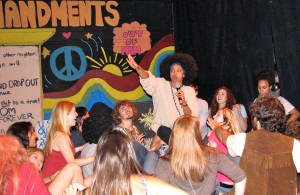Hair cast discusses musical’s relevance
Men and women lounge on blankets and rugs strewn across the floor, sporting afros and tunics. Lovers embrace and sniff flowers. Someone lights incense. The walls are covered with scribbled phrases such as “Draft Beer Not Boys” and “Make Love Not War.” Music fills the room, and suddenly the men and women begin to sing, “I got life, mother. I got laughs, sister. I got freedom, brother. I got good times, man.”

Political protest · Jade Johnson (center) stars as Sheila in USC’s production of Hair: The American Tribal Love-Rock Musical. The production heavily relies on a large ensemble, named the “tribe,” to carry the show. – Charlotte Spangler | Daily Trojan
This might sound like a documentary about the hippies of the 1960s, but these descriptions actually reflect a recent rehearsal for the upcoming production of Hair: The American Tribal Love-Rock Musical. The show follows the story of a tribe of protesting hippies in New York City and dives deep into topics of love, family, drugs and the Vietnam War.
The show is a result of 10 weeks of work by the students in the Experimental Theater Workshop in USC’s School of Dramatic Arts. Considering the proximity of the show’s opening to Election Day, there could not be a more perfect point in time for this show to be performed.
“It is apropos to the issues of the year — especially because our show runs during election week,” Dan Fishbach said, SDA faculty member and director of the show. “It is an important show for people to work on in this time in America. It’s an age of high charged politics just like the time period it takes place in.”
Many themes of Hair are applicable to modern issues, including war, the power of young people and perhaps most importantly this week, the importance of voting and making your voice heard.
“[On Election Day] I realized how applicable it [was],” Lindsay Strongin said, a junior majoring in communication and a member of the tribe in Hair. “The show also closes on Veteran’s Day [Nov. 11] which is another interesting coincidence.”
While the cast planned their production of Hair, they frequently discussed the message of the musical and how they wanted to communicate it to the audience. During this process, the discussion often turned to the play’s themes and relevance to the cast members’ own lives.
“It is neat to watch the cast identify with the show itself and the messages of anti-war, peace and anti-establishment,” Fishbach said.
Many castmates expressed their passion for the ideas of the play, especially on the power of the young person’s voice. Throughout the show, the characters protest the government, discuss contesting the draft and work toward making a difference.
Fishbach noticed this commitment from the students, as well.
“I was surprised by the willingness of students to embrace and start to live the themes of the show. It has been cool to watch students transform into disciples of the show’s themes,” Fishbach said.
Many aspects were easy for the cast to relate to, but others required more work for the actors.
“The Vietnam draft is hard for students to relate to,” Fishbach said. “They had to ask themselves, ‘How do we make this accessible to us?’”
The challenge of appropriately communicating these issues was just one of the problems the cast had to face. The limited rehearsal time (only six hours per week) kept the group from being as prepared as they would have hoped when going in to opening night.
“It is a really big show, and we really had to buckle down these last few weeks,” Kathleen Porter said, a junior majoring in theater and another member of the tribe.
Though discussing the themes of the show was a priority, most of the class’ time was spent on the music. The production boasts 51 musical numbers, most of which involve complicated harmonies, full dance sequences and fast-paced tempos.
“It took us a really long time just to learn all the songs,” Myriam Willard said, a senior majoring in theater and another member of the Hair ensemble.
Other challenges included having to devote time to designing the costumes and set, finding volunteers to be on the tech crew and promoting the show.
“All the actors in this show also worked as choreographers, tech people, designers, etc.,” Porter said.
But despite the challenges, the cast hopes the audience is able to focus on the themes of the play.
“We want people to leave with ‘open eyes,’” Henry Boyd said, a freshman majoring in theater and another member of the tribe, quoting a line from a song in the musical.
Strongin also had hopes for the audience and the impact the show could have on them.
“The least we can hope for is that the audience has awareness and realization,” she said. “Even if they don’t leave with their eyes open, they at least have them open during the show.“
Fishbach explained that the cast constantly brought up issues during class that they thought were applicable.
“This is a show that speaks very directly to audiences,” Fishbach said. “Audiences will have a hard time not identifying with some of the issues and questions posed.”
Despite the challenges, the themes and the format of the show as an ensemble-based production helped bring the cast, or tribe as they are referred to in the script, together.
As Willard summarized on the strength of the cast: “There’s a really spiritual part of this show. We’re all connected. We’re all one.”
Hair: The American Tribal Love-Rock Musical runs from Nov. 9 to Nov. 11 at the Massman Theatre. Visit uscexperimentals.com for ticket information.
